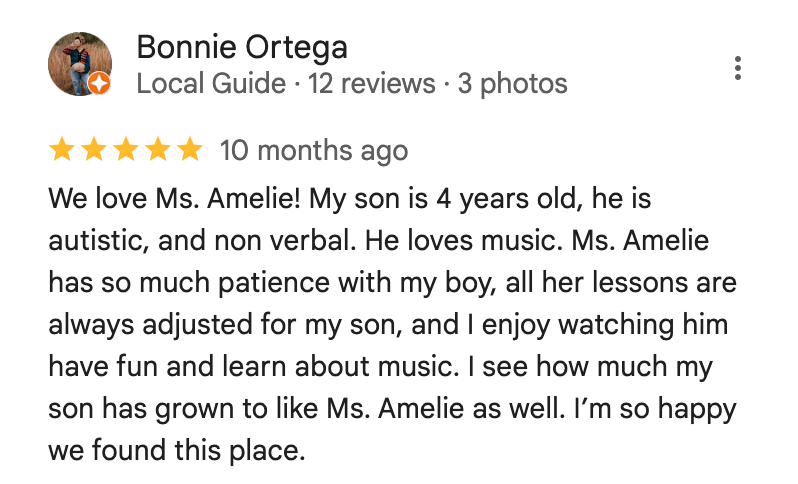🌟 Children’s Guitar Lessons: A Complete Guide for Parents in Kingwood, TX
- Ines Scudellari
- Jun 11, 2024
- 4 min read
Updated: Aug 19, 2025

At Kingwood Arts Academy of Music, we believe that introducing your child to music early can be one of the most powerful gifts you ever give them. Guitar lessons, in particular, help children build confidence, develop focus, and create lifelong joy through music.
Whether you have a curious preschooler or an energetic pre-teen, this comprehensive guide covers everything you need to know about children’s guitar lessons in Kingwood, Texas — from the right age to start to choosing the perfect beginner guitar.
🎵 Why choose guitar lessons for kids?
The guitar is one of the most accessible and versatile instruments for children. Unlike many classical instruments that require immediate precision, the guitar allows students to start making fun sounds quickly.
Benefits of guitar lessons for kids:
Develops fine motor skills and hand-eye coordination
Boosts focus and patience through learning chords and finger placement
Strengthens memory and cognitive abilities
Encourages creativity and self-expression
Builds confidence through achievements and performances
Learning to play the guitar can also set the stage for exploring other instruments and musical interests later on.
🎸 What is the best age to start guitar lessons?
One of the most common questions we get is: “When can my child start taking guitar
lessons?” While each child is unique, we generally recommend starting between the ages of 5 and 7. By this age, most kids have developed the necessary finger strength, motor skills, and focus to begin working with a guitar. However, it’s important to remember that starting too early without readiness can be frustrating.
👉 Read more: When can kids start taking guitar lessons?
👶 What about preschool-aged children?
Preschoolers (ages 3–5) often show interest in music and instruments. While they might not be ready for formal guitar lessons yet, they can start developing musical foundations.
At Kingwood Arts Academy, we offer early childhood music classes that introduce rhythm, melody, and movement. These help build listening skills, body awareness, and an early love for music — all crucial before transitioning to guitar.
🎯 Do I need to buy a guitar immediately?
This is another big concern for parents.
While owning a guitar helps motivate practice, it’s not always necessary at first. At Kingwood Arts Academy, we offer loaner guitars or can help you choose an affordable starter guitar once your child shows commitment.
Key points to consider when buying a guitar:
• Choose the right size (1/2, 3/4, or full size depending on age and height)
• Check for a comfortable neck width and lightweight build
• Consider nylon strings, which are gentler on small fingers
💙 Can guitar lessons help children with ADHD?
Music can be an incredibly effective tool for children with ADHD.
The structure of guitar lessons provides a predictable, encouraging routine, while playing offers a physical and creative outlet. Over time, many students show improvements in concentration, impulse control, and self-esteem.
We’ve seen firsthand how guitar lessons can become a positive focus in a child’s week, helping them channel energy constructively.
👉 Read more: Do guitar lessons benefit an ADHD kid?
🎶 How to motivate your child to practice guitar
Even the most enthusiastic young musicians can struggle with practice at times. Here are some tips to keep them motivated:
• Set achievable goals: One new chord or a short song per week.
• Celebrate milestones: Small rewards or family mini-performances build excitement.
• Join them: Sit with them while they practice — children love company and encouragement.
• Incorporate favorite songs: Kids are more likely to engage when playing tunes they know and love.
• Keep sessions short and fun: Short daily practice is more effective than long, infrequent sessions.
🎸 How to choose the right teacher.
The right teacher makes all the difference. Look for someone who:
✅ Specializes in working with children
✅ Uses age-appropriate methods and materials
✅ Incorporates fun games and activities into lessons
✅ Balances technique with creativity
✅ Builds a supportive, positive atmosphere
At Kingwood Arts Academy, our instructors are not only experienced musicians but also passionate educators who understand child development and know how to make learning a joyful experience.
🏫 Why choose a local academy?
While online guitar tutorials can be a fun supplement, in-person lessons provide personal
feedback and immediate correction — crucial for building good habits early.
Choosing a local academy like ours also offers opportunities for recitals, group classes, and a supportive music community. Your child will see other young musicians, feel motivated by peer performances, and become part of a thriving local network.
🎉 Join the Kingwood Arts Academy family!
Ready to start your child’s musical journey? We make it easy and fun, with flexible scheduling
and a supportive environment tailored to young learners.
💬 FAQs
What type of guitar should my child start with?
We recommend a 1/2 or 3/4 size acoustic guitar with nylon strings for most young beginners.
How long are lessons?
Most children’s lessons are 30 minutes per week to maintain focus and avoid fatigue.
Can my child try different instruments first?
Absolutely! Many young students start with general music classes to explore before committing to a single instrument.
What parents are saying:




Ready to start? Click HERE to request information.




Comments